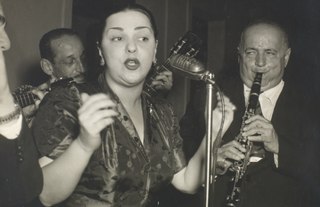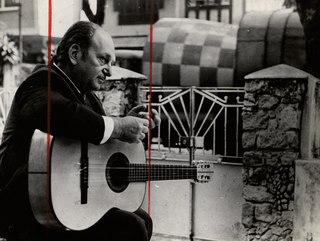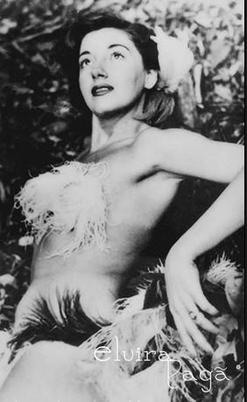Related Research Articles

Choro, also popularly called chorinho, is an instrumental Brazilian popular music genre which originated in 19th century Rio de Janeiro. Despite its name, the music often has a fast and happy rhythm. It is characterized by virtuosity, improvisation and subtle modulations, and is full of syncopation and counterpoint. Choro is considered the first characteristically Brazilian genre of urban popular music. The serenaders who play choros are known as chorões.

Grande Otelo was the stage name of Brazilian actor, comedian, singer, and composer Sebastião Bernardes de Souza Prata. Otelo was born in Uberlândia, and was orphaned as a child. He kept running away from the families that adopted him; only when he took up art did his life become settled.

Oscarito, stage name of Oscar Lorenzo Jacinto de la Inmaculada Concepción Teresa Diaz was a Spanish-Brazilian actor, considered to be one of the most popular comedians of Brazil.

João is a 1991 album by João Gilberto.
Dalva de Oliveira or Vicentina de Paula Oliveira was a Brazilian singer and one of "divas" of the "Radio Era." Her greatest hits included Segredo (Secret) (1947), Tudo acabado (1950), Ave Maria (1950), and Teus olhos verdes (1961). In addition, she recorded frequently with her son Pery Ribeiro, from her marriage with composer Herivelto Martins. She died as a victim of internal bleeding, probably caused by cancer.

Elizeth Moreira Cardoso, was a singer and actress of great renown in Brazil.
Liga Independente das Escolas de Samba do Rio de Janeiro, commonly known by the acronym LIESA, is the principal association that organizes the Carnival of the city of Rio de Janeiro.

Linda Batista, born Florinda Grandino de Oliveira was a Brazilian popular musician.

Grêmio Recreativo Escola de Samba Estação Primeira de Mangueira, or simply Mangueira, is a samba school in Rio de Janeiro, Brazil. The school was founded on April 28, 1928, by Carlos Cachaça, Cartola, Zé Espinguela, among others. It is located at the Mangueira neighborhood, near the region of Maracanã.

Herivelto de Oliveira Martins was a Brazilian composer, singer, and music player.
Pery Ribeiro was a Brazilian singer of bossa nova, MPB and jazz, active as a singer from 1959 until shortly before his death.
The discography of Brazilian singer Maria Bethânia consists of 34 studio albums, 15 live albums, several participations in movie and telenovela soundtracks as well as numerous collaborations with other artists.
Lourdinha Bittencourt was a Brazilian actress and singer who took part in the musical ensemble Trio de Ouro from 1952 to 1957, replacing the lead singer Dalva de Oliveira. She also appeared in telenovelas such as Rosa Rebelde (1969), Véu de Noiva (1969), Irmãos Coragem, (1970), Selva de Pedra (1972), Fogo sobre Terra (1974), and in films such as Poeira de Estrelas (1948), É Proibido Sonhar (1944) and Obrigado, Doutor (1948). She died in 1979 of a stroke.
Berlin to the Samba Beat is a 1944 Brazilian musical comedy film directed by Luiz de Barros. The film was in the popular tradition of chanchadas, featuring stars of the musical stage. It was made by the Rio de Janeiro-based Cinédia studio. It was a follow-up to the hit Samba in Berlin (1944) which made fun of Brazil's World War II enemy Nazi Germany.

Dirce Grandino de Oliveira, known as Dircinha Batista, was a Brazilian actress and singer.

Elvira Olivieri Cozzolino, better known by her stage name Elvira Pagã, was a Brazilian vedette and actress, singer, writer and painter. She was the first Rio Carnival Queen, the first woman to wear a bikini in public, and one of the first women to have cosmetic surgery in Brazil. Talented and controversial, she broke the status quo and faced the reigning "machismo" with fearless audacity during the Brazilian military dictatorship and the revolutionary 1960s, where she lived with determination and courage. Pagã retired from public life, wrote and painted in her later years, dying a recluse.

Carmelita Madriaga, known as Carmen Costa, was a Brazilian singer and composer.

Orgulho e Paixão is a Brazilian telenovela produced and broadcast by TV Globo. It premiered on 20 March 2018, replacing Tempo de Amar, and concluded on 24 September 2018, being replaced by Espelho da Vida. Created by Marcos Bernstein, the plot is inspired by the novels: Sense and Sensibility (1811), Pride and Prejudice (1813), Emma (1815) Northanger Abbey (1818) and Lady Susan (1871), all by Jane Austen.
References
- ↑ Benamou, Catherine L. (2007). It's All True: Orson Welles's Pan-American Odyssey . University of California Press. pp. 44–. ISBN 978-0-520-93814-4.
- ↑ Martins, Herivelto (2000). O melhor de Herivelto Martins: melodias e letras cifradas para guitarra, violão e teclados (in Portuguese). Irmãos Vitale. pp. 9–. ISBN 978-85-7407-108-4.